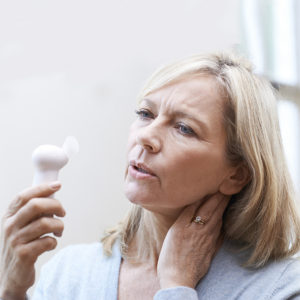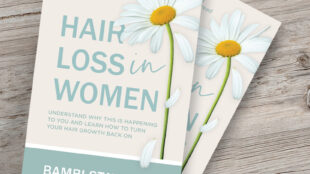Hair loss during menopause
Could menopause be affecting your hair?
As if the mood swings and hot flushes aren’t enough, hair loss during menopause can be a common but troubling symptom to add to the list of changes your body is going though.

Menopause hair loss can be troubling for many women.
Hair loss during menopause is a big issue for some women, for others it’s dry and damaged-looking hair. Both equally troubling and problematic when you see your luscious locks disappear as if before your eyes.
What causes hair loss during menopause?
There’s not one simple answer as to why hair starts falling or changes condition. We know that a number of factors can contribute and that these can be exacerbated during menopause. Including;
Nutritional Deficiencies:
- Despite a balanced diet, as we age our bodies become less efficient at digesting food which often results in inadequate absorption of vitamins and minerals. Protein is a very important part of a healthy diet and essential for healthy hair, nails and skin. We often fall into the trap of not consuming enough protein and too many carbohydrates. It’s important to remember to keep up your protein intake to help keep hair healthy.
Zinc and Iron:
- Zinc and Iron are also essential for healthy hair growth. We find that fewer women are iron deficient after menopause as they’re not experiencing monthly depletion though periods but it could be worth getting your levels tested.
New Medications:
- As we age, we often find ourselves taking more medication for different conditions. Side effects to medication can be quite individual and for some of us, that means hair loss. Be sure to discuss this side effect with your GP as there may be an alternative medication that suits you better.
Hormones:
- Experts don’t really know why menopausal hair loss is concentrated to the scalp while unwanted hairs often pop up in other places – like those pesky upper lip and chin hairs! There seems to be some link to hormonal changes during menopause, it’s just not clear exactly what! It was thought that women with excess testosterone (hyperandrogenism) are more prone to hair loss but many women with low testosterone also experience the issue. As progesterone levels reduce throughout menopause, androgens have been known to cause changes to the hair follicles and sebaceous glands on the scalp. The result is often a reduction in the number of hair follicles altogether, or decreased size and quality of the follicles, resulting in finer and coarser hair growth. Healthy hair needs good sebum to grow so hair may also become drier as sebum production decreases.
Thyroid Dysfunction:
- The thyroid is responsible for controlling hormone balance, moods and metabolism. It can also be responsible for significant hair loss if your thyroid function is under or over active. Another good thing to ask your GP to check for you.
What can you do to help hair loss during menopause?
A woman’s first experience of hair loss during menopause can be quite daunting. But you’re not alone; it’s a very common symptom of menopause. In fact, up to 80% of women experience some form of hair loss by age 60.
It’s worth talking to your GP about the problem if you’re concerned about any of the possible causes listed above.
Hair Concealers
 If lack of confidence is a concern or you are feeling less than feminine, the first thing to do is to get yourself a concealer. The best hair loss concealer for women these days is BOOSTnBLEND. It is an organic cotton product that comes in many hair colours. You simply shake it on and blend it in with your fingers, and any signs of visible hair loss disappears.
If lack of confidence is a concern or you are feeling less than feminine, the first thing to do is to get yourself a concealer. The best hair loss concealer for women these days is BOOSTnBLEND. It is an organic cotton product that comes in many hair colours. You simply shake it on and blend it in with your fingers, and any signs of visible hair loss disappears.
Healthy Scalp
Longer term, there are some things you can do day-to-day to help treat the problem. We know that good scalp care is essential to healthy hair growth and during menopause when your sebum supplies are drying up and follicles becoming smaller, it’s all-the-more important to nourish your scalp as well as hair.
If your hair is becoming drier, resist the temptation to wash it less because it doesn’t feel oily. For women with thinning hair we recommend washing your hair more often than once a week. The oils that build up on your scalp clog your follicles and for healthy hair growth, follicles need to be free of build-up. So washing more often is definitely recommended. If you are washing your hair less often to preserve it, then we can assure you that washing your hair doesn’t cause it to fall more.
Hair Treatments
We highly recommend using a good quality oil on your scalp. Either put it in the night before you are planning to wash your hair, or put it in half an hour before you wash your hair. Our scalp is just skin with lots of hair follicles in it, and it needs to be treated like the skin everywhere else. We apply face and body creams, so why not moisturise your scalp? Makes sense, right? Carelli Oil is the best on the market. It smells divine too!
You may find that your conditioner just doesn’t seem hydrating enough anymore. For dry and unmanageable hair, try replacing your conditioner with a hair treatment. We love the Kerastase Nutritive Masque Magistral and Carelli Gloss, a treatment-strength conditioner.
If you experience sudden or dramatic hair loss during menopause, please consult the advice of your GP.
Are you experiencing another pesky side-effect of menopause – the weight gain? Want to drop a few kilos? This eating plan could be the answer!






Thinning hair since surgery and wright loss
I have reached the age of 70 and only now have started to go grey. I have tone -on -tone highlights but since having them I have noticed my hair is losing its shine and starting to get thinner
Thanks for the share. This is really a tough moment in any women life and she goes through a painful and awkward journey in this phase. Here not only women I believe all men should stand with them and make them understand they are not alone in their fight.
Wow. You are the first man I’ve ever heard of that is sensitive to women’s hair loss. Thank you for making my day!
I have thryroid issues I think that may be my problem with my hair thinning
Hi Janet, Yes it could well be. I hope your doctor can offer some support.
My hair thinned out after early menopause and now stress is making it worse.
Yes, unfortunately stress is a huge factor in female hair loss. Work on getting your stress levels down, and while that sounds impossible, if you are working on it and make it a priority, then that will help. Try having a regular massage or taking time out for yourself in other ways.
I am experiencing thinner hair I have been taking aledronic acis for osteopenia. I need to take this as I have had two fractures and the NHS in my area do.not offer an alternative.